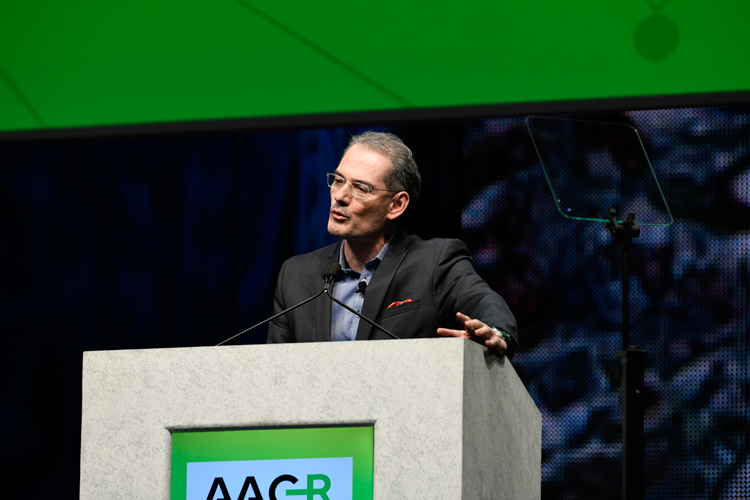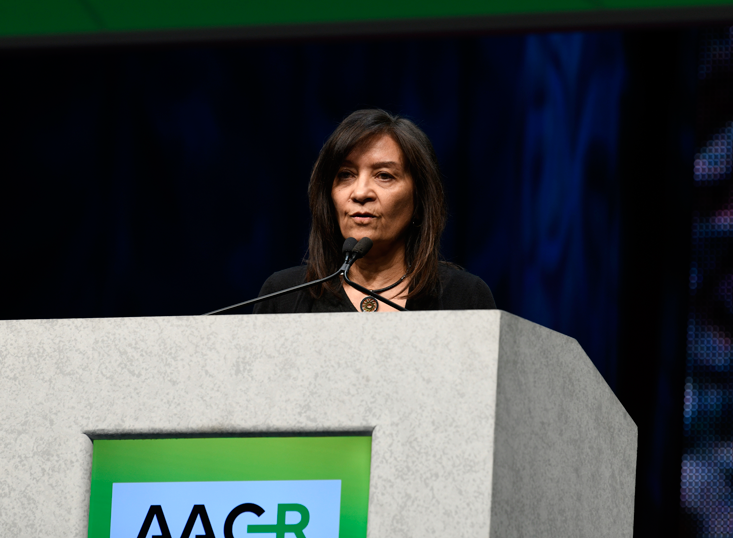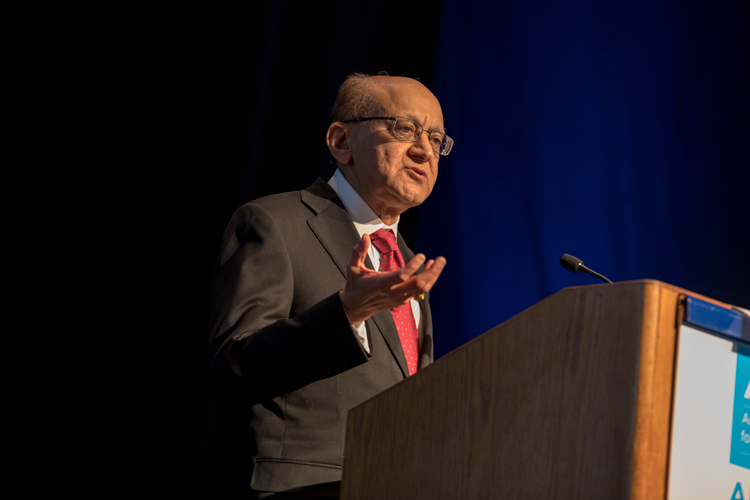“Immune checkpoint therapy has joined the ranks of surgery, radiation, and chemotherapy as a pillar of cancer treatment,” proclaimed Padmanee Sharma, M.D., Ph.D., a former CRI clinical grantee at the University of Texas MD Anderson Cancer Center, during her opening plenary session talk at AACR18.

In particular, checkpoint immunotherapy approaches, such as those that target the PD-1 and CTLA-4 pathways, have led to remarkable responses in patients for whom no other treatments worked. However, Dr. Sharma emphasized that there are still outstanding questions that need to be answered in order to improve their effectiveness for more patients.
“Why do some patients respond and not others? Can we identify biomarkers that predict response? Are there other pathways that can be targeted to improve clinical outcomes?” As Sharma noted, we “need to integrate clinical and laboratory research in order to answer these questions.”
To that end, Sharma gave an overview of MD Anderson’s efforts to comprehensively characterize the activity of the immune cells in the patients they treat, and they’ve already analyzed over 42,000 tumor tissue samples, from both before and after treatment, looking for clues regarding how treatment outcomes relate to immune cell infiltration into tumors.
One strategic avenue that Sharma and her colleagues are exploring to enhance checkpoint immunotherapy’s effectiveness in more tumor types involves targeting other immune-related pathways in combination with existing immunotherapies. Of special interest were ICOS, whose “role in effector T cell responses and anti-tumor immune responses is now well established,” and CD40, which is “important for the maturation of antigen-presenting cells and for enabling T cell co-stimulation.” Sharma spoke about one example of this approach: a recently launched CRI Clinical Accelerator trial testing a CD40-based immunotherapy in combination with checkpoint immunotherapy and chemotherapy for patients with pancreatic cancer.
Lastly, Sharma discussed three other approaches with the potential to complement existing immunotherapies, including: targeting macrophages through the VISTA and CD47 pathways; targeting immune-suppressing regulatory T cells through an epigenetic modulator that inhibits EZH2; and utilizing oncolytic virus immunotherapies, such as New Castle Disease virus, as a way to convert “cold” immunotherapy-resistant tumors into “hot” ones that are susceptible to checkpoint immunotherapy-induced immune responses.
In the same opening plenary session, George Coukos, M.D, Ph.D., of Ludwig Cancer Research and the University Hospital of Lausanne, discussed some cutting-edge insights into ovarian cancer, a tumor type that’s typically resistant to immunotherapy.

Coukos, who is currently leading an ovarian cancer clinical trial sponsored by CRI’s Clinical Accelerator, sought to understand why PD-1/PD-L1 immunotherapies are often ineffective for these patients, even though ovarian tumors are often infiltrated by “killer” T cells that recognize tumor-specific neoantigens and express high levels of PD-1. In one study involving nineteen patients, Coukos found that one-third had T cells in their blood that recognized their tumors.
He then laid out his strategy for figuring out how to take advantage of the tumor-targeting T cells that patients already possess, and stressed the need for improved systems biology tools, including the ability to perform automated, high throughput analyses to perform deep interrogations into patients’ T cell repertoires. The high-dimensional data gained through this approach could then be used to construct a more comprehensive view of the immune networks within ovarian tumors.
At the end of his talk, Coukos turned his attention to a dendritic cell vaccine approach in combination with a VEGF-targeting antibody and chemotherapy. When he asked, rhetorically, if this vaccine induced immune responses against tumor neoepitopes, Coukos informed the audience “the answer is ‘absolutely, yes.’” In all patients who were vaccinated, his team found tumor-targeting T cells, and he noted that in addition to augmenting pre-existing T cell responses, the vaccine also stimulated new T cell responses against tumors.
While the vaccine approach above exposes a patients’ immune cells to tumor fragments and allows them to identify tumor targets on their own, other vaccine strategies—such as that showcased by the Mt. Sinai School of Medicine’s Nina Bhardwaj, M.D., Ph.D.—tell the immune system exactly which neoantigens to target.

Bhardwaj, a CRI Clip Investigator and Clinical Team Leader who is also involved in CRI’s Tumor neoantigEn SeLection Alliance (TESLA), first discussed the computational pipeline that her team is using to identify patient-specific neoantigens to target via vaccines. Through this approach, she showed in mice that vaccine-induced immune responses—which correlated with predicted MHC binding affinity and the measured peptide-MHC complex stability—were associated with positive outcomes. The anti-tumor activity induced by vaccination was also enhanced when combined with checkpoint immunotherapy.
In the phase I PGV-001 trial evaluating this approach in solid tumors, one of the first patients treated exhibited strong signs of polyfunctional neoantigen-specific CD4+ T cell responses against his laryngeal carcinoma. Additional trials utilizing this vaccine are ongoing in glioblastoma, while a vaccine and checkpoint immunotherapy combination trial is being planned for patients with bladder cancer.
In addition to oral presentations, CRI scientists led work that was highlighted during poster sessions on Sunday. These included:
- Ignacio Melero, M.D., Ph.D., a CRI CLIP investigator at the Foundation for Applied Medical Research in Spain, who demonstrated that the combination of a dendritic cell vaccine, adjuvant poly ICLC (a TLR agonist), and radiotherapy provided signs of clinical benefit in patients with advanced cancer.
- Peiwen Chen, Ph.D., a CRI postdoctoral fellow at the University of Texas MD Anderson Cancer Center, who revealed that PTEN-deficient glioblastoma cells produce increased amounts of lysyl oxidase, which aids in the recruitment of macrophages. He also identified this trend in samples from glioblastoma patients and found that this activity was associated with worse survival.
- Patrick Hwu, M.D., a member of the CRI Scientific Advisory Council at the University of Texas MD Anderson Cancer Center, who observed that resiquimod (a TLR agonist) was able to enhance the effects of vaccination and promote increased melanoma regression through activation of plasmacytoid dendritic cells.
- Rakesh K. Jain, Ph.D., a CRI CLIP Investigator at Harvard Medical School and Massachusetts General Hospital from 2015-2017, who observed that hypoxia (low oxygen levels) can influence antigen presentation by breast cancer cells and may serve as a potential mechanisms through which these tumors evade immune responses and resist immunotherapy efforts.
- Markus Muschen, M.D., Ph.D., a CRI CLIP investigator at the University of California, San Francisco, who found that cancerous B cells often repress the pentose phosphate metabolic pathway and that this trait can potentially be exploited as a therapeutic vulnerability.

We'll be back with a recap of Day 3, which promises to reveal compelling clinical data that is certain to generate a lot of excitement among the researchers attending the conference as well as patient advocacy groups focused on the cancer types that will be discussed on Monday, April 16.